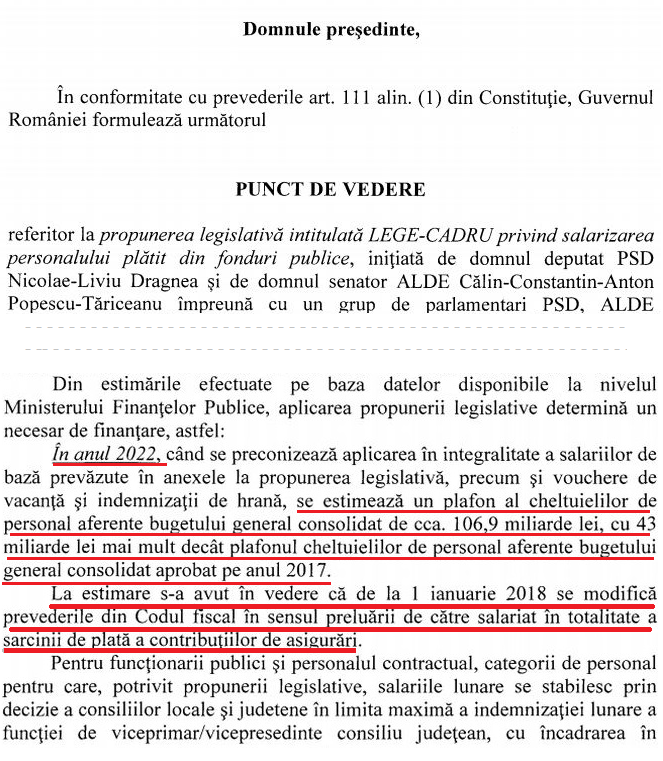 The net wage increases generated by the unitary pay law will be neutralized, at least in the first year, by the transfer to the employee of all social contributions as of 1 January 2018.
The net wage increases generated by the unitary pay law will be neutralized, at least in the first year, by the transfer to the employee of all social contributions as of 1 January 2018.
That means that much of the wage increase will return to budgets in the form of taxes paid by the employee.
This is also the explanation for Minister Olguta Vasilescu’s statement, according to which some net salaries are to decrease following the wage increases – and the sensitive contradiction to the same minister’s statements, according to which the salaries below 4,000 lei would be doubled.
All that means that the salary increases will have a limited impact on the budget deficit, as the unitary pay law makes use of this innovation of transferring the contributions initiated last year by Secretary of State Gabriel Biris.
The mention appears in Grindeanu government’s view regarding the framework law on the remuneration of staff paid from public funds:
When estimating the impact of this law, states the document signed by the Prime Minister, „it was considered the fact that as of 1 January 2018, the provisions of the Tax Code will be amended so that the employee will take over the full state insurance contributions„:
 How social contributions are paid now
How social contributions are paid now
At present, social contributions for normal work conditions account for 39.25% of the gross salary and are paid as follows:
Pension contributions – 26.3% for normal work conditions
- 5% for the employee’s individual contribution
- 8% for the employer’s contribution
Contributions to health insurance – 10.7%
- 5% for the individual employee contribution
- 2% for the contribution due by the employer
Unemployment contributions – 1%
The rates of unemployment insurance contributions that apply this year are as follows, also with the mention that they have also been applied in 2016:
- 5% for the employee’s individual contribution
- 5% for the contribution due by the employer
Contribution to the Guarantee Fund for the wage claims – 0.25%
- paid by the employer
Holidays and social health insurance contribution – 0.85% (paid by the employer)
Work accidents and occupational diseases insurance contribution – 0,15% (paid by the employer)
Overall, calculations show that an employee (either from the state or the private sector) will pay from the gross salary additional contributions of 22.5%, instead of 15.75%. So, for the increase to also be seen in the net wage, it should be higher than the sum of the contributions transferred to the employee.
In the case that another measure from the government program will be complied with, total contributions of 39.25% will be reduced as of 1 January to 35% of the gross salary.
Regarding the state employees, the additional amounts implied by in this tax novelty will come exactly from the wage increases that appear in the pay scales.
The trend will also be followed for private employees
Once the transfer of contributions from the employer to employees takes place, the increase of gross salaries becomes pressing for private companies as well.
To maintain employees’ net salaries after the transfer of contributions, employers from the private economy will have to increase gross wages, in relation to the decrease of the companies’ costs for the contributions to state budgets.
Finance Minister: Impact on net salaries will be almost neutral
Ionut Dumitru, President of the Fiscal Council, has recently announced that the budgetary impact of the unitary pay law is almost double the one presented by the Government, amounting to about 60 billion lei, compared to over 30 billion, as in the Government’s estimation.
Now, after the transfer to the employee of all contributions has been added to the equation, things are easy to explain: basically, much of the „gross” increases granted to the state employees (by the unitary pay law) are neutralized by the increase in taxation on the employee side (by the Tax Code).
That has already been confirmed by Minister of Finance Viorel Stefan, who stated in his interview with Reuters that most of the wage increases will come back to the budget in the form of taxes:
„What the public opinion has not understood yet is that the wage increases from the public sector introduced by law include the social security contributions. That makes the impact on net salaries almost neutral.”
Also, the enthusiastic increases announced by the Minister of Labour, Olguta Vasilescu, by 50, 60 or even 100%, refer to the gross salary, which will also include the tax transfer. And anyway, the increases will be applied gradually, by 2022.
Staff costs in 2022 – nearly 107 billion lei
The impact is neutral only in the first year of application of the unitary pay law and in the coming years, with the 2022 horizon, it will grow year by year. According to the Ministry of Finance’s calculations, the financial effort for 2022 is 43 billion lei, which means a total of 106.9 billion lei staff costs in the state budget (a 67% increase in current expenditures of 64 billion lei).
The monthly minimum gross national wage is forecasted for the same year of 2022 to 2,500 lei.
Priority areas for wage increases
According to the explanations given Tuesday in the Chamber of Deputies, average increases will be 5 to 10%.
They will be applied first and to a greater extent to some categories of state employees (dignitaries, police officers, military personnel, doctors), as can be seen in the timetable of the unitary pay law.
Impact in 2017:
- 55 billion for increasing the wages of police officers, military personnel and security guards, as well as dignitaries, and increasing the allowances for meetings granted to local councillors
- 73 billion lei for holiday vouchers
Impact in 2018:
- 3 billion lei for the increases (total for doctors and dignitaries, by 50% for teachers, by 25% – the basic salaries, military salaries and function salaries)
- 3 billion lei, holiday vouchers
- 8 billion lei, food allowance (in the equivalent of two minimum wages per state employee)
Publicly appointed office-holders:
- The President of Romania (who will have a salary of 18,120 lei next year, because the minimum national wage will be 1,510 lei), the state advisers and presidential advisers
- MPs (will have 13,590 lei next year)
- Ministers, state secretaries and undersecretaries of state, secretary general of the Government, state advisers
- The Ombudsman
- The presidents and plenum members of CNSAS, Competition Council, the Permanent Electoral Authority, CNA, etc.
- Mayors and deputy mayors, presidents and vice-presidents of county councils
- Prefects and subprefects









